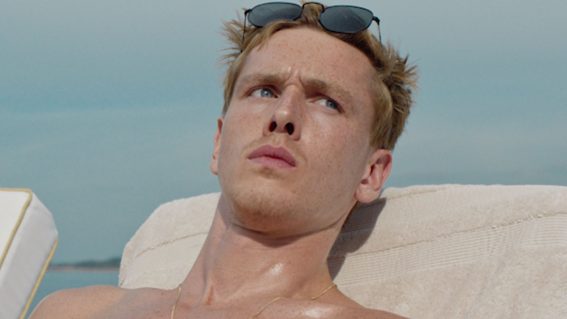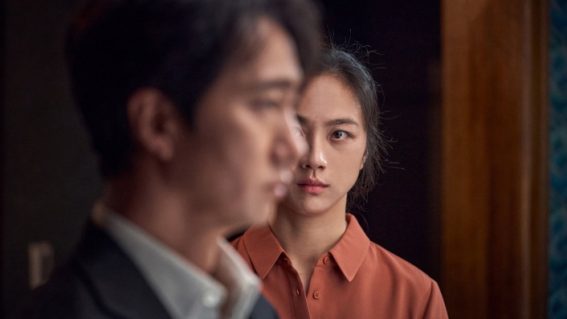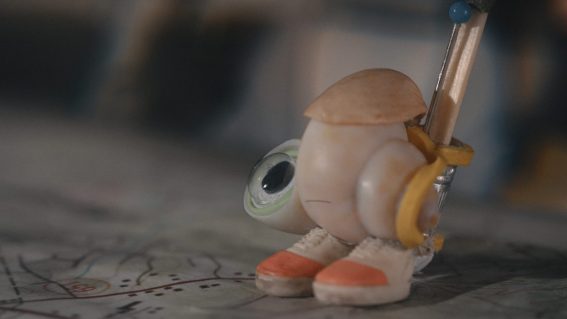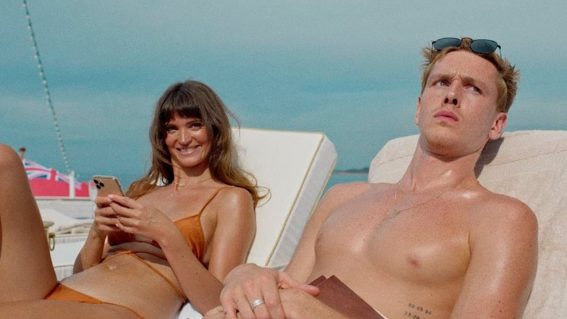NZIFF 2022 mini-reviews (F – L)
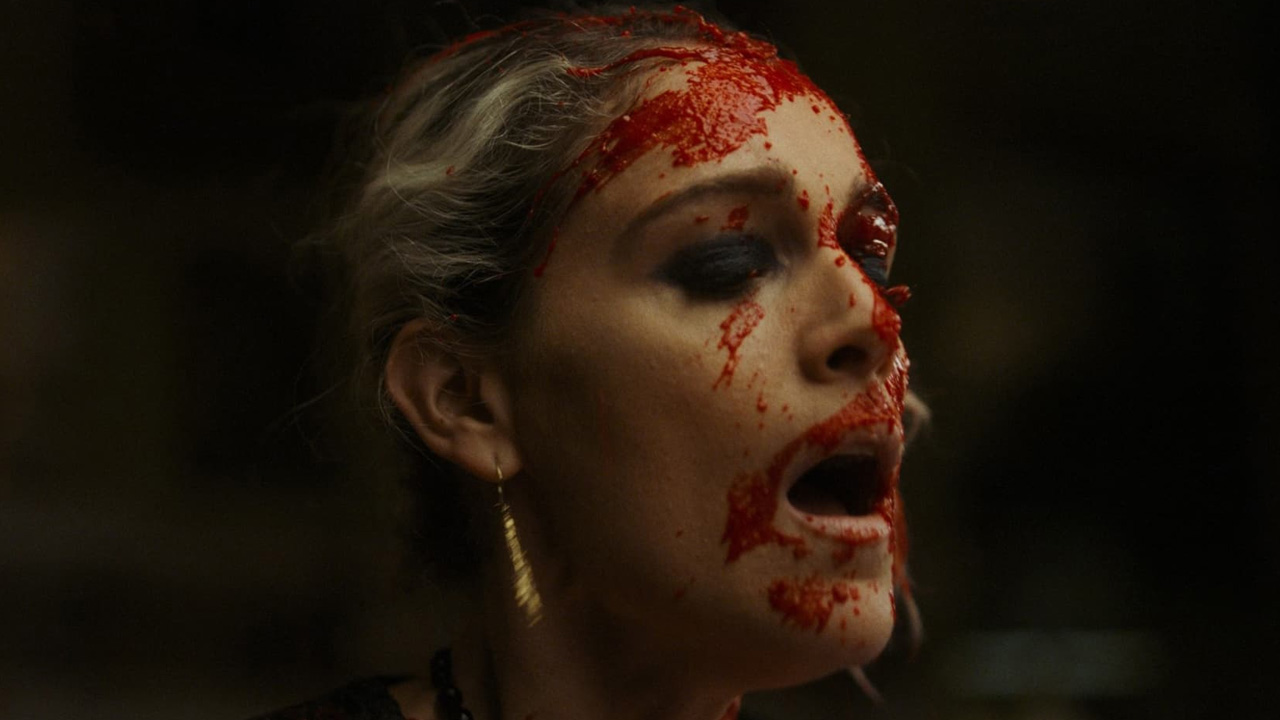
Our writers share their thoughts on this year’s Whānau Mārama: New Zealand International Film Festival selections.
This year’s festival features plenty of gems (even if they might not all be available throughout Aotearoa). Our team of keen reviewers has been busy watching, and rendering their verdicts.
All 2022 mini-reviews:
Latest reviews | A – E | F – L | M – R | S – Z
Family Dinner
Well-executed rural dietary chiller establishes an interesting character in a former cookbook queen now put out to pasture, and makes some canny observations about weight loss (the question ‘who are you to tell me how to feel about my body’ has a different tone here). A signposted ending detracts somewhat, a third act that could also have gone into more out-there places, but your response to this one will really come down to personal, um, taste. STEVE NEWALL
Fire Of Love
Wes Anderson must be feeling somewhat exposed right now, as these two volcanologists and their 1970s more-Zissou-than-Zissou exploits, camping out at the edge of active volcano craters, resplendent in red beanies and silver sci-fi suits, must surely have been his inspiration for everything he’s ever done. Nothing rings sweeter than two oddballs in love, finding each other against the odds and living their best and most unlikely lives, while shrugging in the ashy face of death. Just brilliant. MATTHEW CRAWLEY
Unbelievable close-up footage of live volcanoes and, honestly, edible-looking magma (I can’t be the only one thinking this). The footage is all shot by the eccentric and charming volcanologist couple Katia and Maurice Kraff and it absolutely deserves to be seen on the biggest screen you can get to. Their love of the volatile natural world is infectious and it’s hard not to get swept along in their enthusiasm. Miranda July as the dreamy narrator is a treat and the score is beautiful. Could the narrative have been tighter? Yes—but that’s not the reason you’re coming to see this one. RACHEL ASHBY
Sara Doser’s fascinating documentary on Katia and Maurice Krafft’s love for one another and volcanoes is a tragic true-love tale featuring must-see-on-a-big-screen cinematography. Charting the volcanologists’ adventures through to the fatal eruption of Japan’s Mount Unxen’s in 1991, it’s a riveting, moving, and awe-inspiring reminder of nature’s stunning beauty and terrifying power. ADAM FRESCO
An easy big-screen recommendation just for the eye-widening, never-to-be-replicated footage of scientists Katia and Maurice Krafft posing casually right next to lava-spewing volcanoes. Beyond the spectacle (and there’s a lot of it), their love story is a truly beguiling one, two nerds who knew more about themselves and their passions than 99% of us. #CouplesGoals indeed. LIAM MAGUREN
Flux Gourmet
At a screening where I recognised many art school and music community nerds, Flux Gourmet went down a treat. Much more of a camp satire than Strickland’s last festival outing In Fabric, it lacks some of the sophisticated tension which that previous film wowed audiences with. However, if you are a fan of deadpan silliness or Gwendoline Christie wearing increasingly large hats, there is much to love—and love it I did. RACHEL ASHBY
Be it Italian Giallo horror stylings, sinister sounds, or a killer dress, Peter Strickland’s movies are an acquired taste. In Flux Gourmet he delivers another fetishised freakout, this time firmly focused on food. The cast (including Gwendoline Christie, Asa Butterfield, and Fatma Mohamed) play it serious, only adding to a dark comedy serving up memorable incidents, ideas, visuals, and a sumptuous smorgasbord of sound. Less than the sum of its parts, but the synesthesia conceit of cuisine as music is a delicious treat. An arty, and literally farty, amuse-bouche that, being a little half-baked, left me hungry for a more substantial serving. ADAM FRESCO
Combining a very English brand of surrealism with full-noise psychosexual giallo camp, Flux Gourmet follows a troupe of culinary sound artists and the gastrointestinally-distressed journalist documenting their latest residency. Absurd, scatological, and laugh-out-loud funny, Peter Strickland’s latest outing somehow manages to double as the most telling exploration of “being in a band” since Some Like It Hot. AMELIA BERRY
Perhaps never has the word “flanger” been so repeated onscreen and never have I seen “sonic caterers” conjure audio experiences from their cooking (as director Peter Strickland himself did in a likeminded band way back when). Less focused narratively and sadly lacking the rigorous visual aesthetic of Strickland’s previous efforts there’s still a ton to enjoy here, not least of all the film’s critique of meddling arts funders, taking place in tandem with devolving inter-band dynamics and an individual narrating his problems with excessive flatulence (all delivered by po-faced acting pros). First walkout I’ve seen this festival and, boy, if the first half of the film bothered them… STEVE NEWALL
Gloriavale
Earns its place among the various other media coverage of Gloriavale in recent years with its patient, human focus, spending a feature-length amount of time with two former members and their legal team as they seek justice and fairness. Impossible not to draw parallels with recent international exposés of religion-turned-cult, an ace up the film’s sleeve is the participation of founding (and current) member Sharon Ready, who offers a seldom-seen perspective. STEVE NEWALL
Godland
Good grief, it seems that once in a blue moon they do make them like they used to. Godland came boldly compared to classic era Herzog, and while that’s a huge call, this film truly does live up to that niche hype. With a touch of the Kelly Reichardt school of slow burning, gentle dread mixed with 2014 NZIFF favourite Jauja’s eye-popping landscape capturing, this tale of a single-minded mission by a photography-loving Danish priest in 19th century Iceland is one I’ll be raving about annoyingly for years. MATTHEW CRAWLEY
Hlynur Pálmason’s third film is an austere, graceful, transporting piece of filmmaking, painstakingly traversing the terrible, harsh, topographic beauty of his homeland to unspool a slow-burning, test-of-faith narrative. Conjuring Conrad, Herzog and Dreyer, it’s a long, enigmatic, often visually spectacular trudge where ideology, colonialism and nature collide via the quietly volcanic rupture of a young Danish priest’s conviction to his mission. AARON YAP
A big-screen juggernaut. Rivals The Northman as this year’s most transportive historical cinematic experience, cemented by Elliott Crosset Hove’s deer-in-the-headlights performance as a priest slowly drained of his being. Didn’t expect to laugh as much as I did either, but those dry slaps of humour always got me. Maria Von Hausswolff’s cinematography feels like it came straight from God’s eyes, paired with some of the most mind-blowing match-cuts I’ve ever seen. LIAM MAGUREN
Hlynur Pálmason’s third feature continues his preoccupation with Icelandic landscapes and weather patterns, and their perceived effect on a certain type of man. After a mesmerising first half following a Danish priest and his party venturing into 19th century Iceland, the film stalls somewhat as it settles into its endgame. What lingers are Pálmason’s incredible, patient images; pristine vistas populated by ultimately unimportant people, haunted by the distant smudge of an active volcano. TONY STAMP
The Good Boss
Javier Bardem has played some of my favourite psychopaths, so it’s a pure pleasure to see him romp around the big screen as the titular “good boss”, with echoes of a tightly wound Gus Fring (minus the meth) and other smiling madmen past. As the owner of a factory that manufactures… scales… metaphors abound as the balance of boss man’s perfect life begins to tip in and out of his favour, and his control. MATTHEW CRAWLEY
Hallelujah: Leonard Cohen, a Journey, a Song
A delightful documentary charting the much-covered Leonard Cohen song, this brings the essential elements of sight and sound to Alan Light’s brilliant book The Holy or the Broken, which charted Cohen’s masterpiece on a journey through music history, from cover versions by Bob Dylan and John Cale to Jeff Buckley and Dreamworks’ animated movie Shrek. Not just for Cohen aficionados, this is for anyone interested in modern music, but for Leonard lovers like me, it’s a joyous celebration in song of Cohen’s lasting legacy. ADAM FRESCO
The Humans
Very obviously based on a stage play, this family get-together drama nonetheless justifies its cinematic adaptation. Beyond the superbly controlled performances and big slaps of humour, the film’s use of space (AKA a leaky bum-hole of an apartment) intertwines with underlying feelings not present at the dinner table, framed in a tight and choking manner reminiscent of Florian Zeller’s The Father. It’s meandering, understated, and heavy on dialogue, so avoid it if you can’t stand those things. I bloody love it when it’s done this well though, and especially enjoyed the faint notes of the haunted house genre. LIAM MAGUREN
Incredible But True
A comedic French take on a Twilight Zone-style morality tale, Incroyable Mais Vrai sees a man’s life fall apart after he and his wife purchase a house with a strange temporal anomaly inside (and it doesn’t help that his boss has become obsessed with his new surgically-installed iPenis). While it’s undeniably funny and well-observed, the film feels like it just runs out of steam, giving us a wildly long montage instead of a third act and landing with a bit of a dull thud. Hard not to feel disappointed walking out of this one. AMELIA BERRY
French director Quentin Dupieux has two kooky films at this year’s NZIFF, and for me, this one’s the funniest. A couple buy a suburban house with impossible, gravity-defying architecture, and gain a neighbour with a malfunctioning robotic dong. Bizarre, bonkers, and briskly paced, it’s yet another example of Dupieux skirting over interesting ideas to create an entertaining but thin tale that feels more like a series of comedy skits than a full-blown surrealist satire. But damn, it’s fun. ADAM FRESCO
Wanting to take someone to NZIFF but they’re more of a “whimsical French comedy with a glass of chardonnay” type, and your favourite film is Timecrimes? Quentin Dupieux (Deerskin, Rubber) has your dream date sorted. Farcical and unlikely scenarios unfolding between two middle-aged married couples? Check! Brilliant and bonkers plot device that can’t be described here without ruining it for you but just trust us it’s beautifully demented? Check! Two electronic thumbs up. MATTHEW CRAWLEY
Big cheese-dream energy from this one. Starts off a bit kooky, quickly descends into total screwball pastiche. A not-so-subtle, but thoroughly goofy morality tale about vanity and mid life crises. Points for the time travelling drain and 15-minute-long montage. RACHEL ASHBY
Juliet Gerrard: Science in Dark Times
Great and incredibly appropriate to be able to see this in Tāmaki Makaurau after last year’s COVID-cancelled festival here. Shirley Horrocks offers an insightful documentary portrait of our PM’s Chief Science Advisor, one that brings Gerrard’s engaging personality to the fore alongside her academic and scientific nous. Makes a strong case for how people skills, empathy and a focus on understanding by both Gerrard and the PM proved immensely important to Aotearoa’s COVID response (though this is about more than the pandemic). STEVE NEWALL
Kāinga
Compared to Waru and Vai, this pan-Asian collection of the Aotearoa anthology trilogy feels like the most intimate of the three films. With a single house anchoring the eight stories over decades, and the dynamic definition of ‘home’ admirably explored, that quality is fitting and earned. The filmmakers’ sturdy signatures are evident in the stories they tell and the outfitting of the house—a quietly powerful visualisation of a transforming time and place that slowly creeps in on you. And shout-out to Drew Sturge, whose camera once again helps thread these cinematic snapshots of a criminally underseen New Zealand. LIAM MAGUREN
Living up to both its title and the anthology films that have preceded it, Pan-Asian experiences over the decades in Aotearoa are explored through the stories of a succession of families living in one location, 11 Rua Road. This narrative device works a treat—through its single location, Kāinga offers a window into the movement of lives throughout our country over time, capturing personal moments that feel both specific and universal. STEVE NEWALL
Kurt Vonnegut: Unstuck In Time
Curb Your Enthusiasm producer Robert B Weide’s documentary on the author of Slaughterhouse-Five and Breakfast of Champions is a love letter to Vonnegut’s life and work. Shot over twenty years, this wears its dedication to its subject on its sleeve and is as much about the friendship of Vonnegut and Weide as it is about one of the foremost popular US writers of the century. Enjoyable, outrageously one-sided, fascinating, and infuriating by turns, it can be fairly criticised for skipping over the more questionable aspects of Vonnegut’s family and romantic life, but as a heartfelt memorial it entertainingly honours the writer as a humanist, humourist, and heir to Mark Twain’s popularist throne. ADAM FRESCO
All 2022 mini-reviews:
Latest reviews | A – E | F – L | M – R | S – Z

